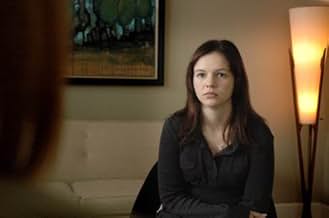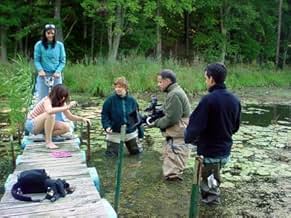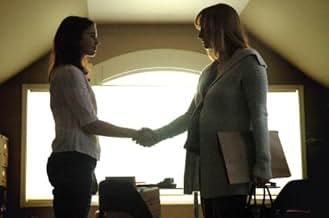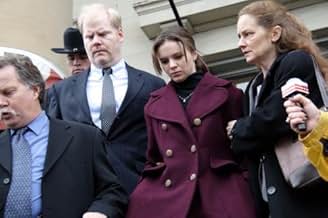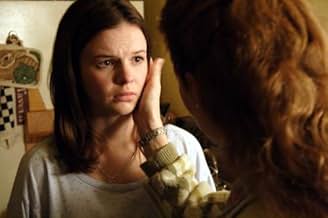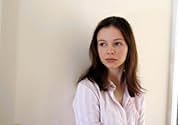Ajouter une intrigue dans votre languePregnant forensic psychologist Lydie Crane is hired to learn the truth behind the case of 16-year-old Stephanie Daley, who is accused of concealing her pregnancy and murdering her infant.Pregnant forensic psychologist Lydie Crane is hired to learn the truth behind the case of 16-year-old Stephanie Daley, who is accused of concealing her pregnancy and murdering her infant.Pregnant forensic psychologist Lydie Crane is hired to learn the truth behind the case of 16-year-old Stephanie Daley, who is accused of concealing her pregnancy and murdering her infant.
- Réalisation
- Scénario
- Casting principal
- Récompenses
- 5 victoires et 5 nominations au total
Avis à la une
I have no idea why this film, or many of the other Sundance films for that matter, are rated so low on IMDb. It's a shame, because this is a remarkable film.
Amber Tamblyn gives the best performance of her career and deserves an Oscar for her subtle, eerie picture of teenage confusion, fear and malice. Tilda Swinton is also very good as the detective investigating Daley's case, and both Melissa Leo and Timothy Hutton give solid backup.
See this movie - it is a frightening and eye-opening portrait of real life. ****/*****
Amber Tamblyn gives the best performance of her career and deserves an Oscar for her subtle, eerie picture of teenage confusion, fear and malice. Tilda Swinton is also very good as the detective investigating Daley's case, and both Melissa Leo and Timothy Hutton give solid backup.
See this movie - it is a frightening and eye-opening portrait of real life. ****/*****
It's funny, at the average video store, it's really a hit or miss game - you can't tell anything by the cover art. Picking up random titles is something of a habit, some hit, most miss, and with some you really have to wonder if the people who released the film have actually watched it. Every so often, however, you get a very pleasant surprise, and Stephanie Daley is one of the reasons I love the movies.
Hilary Brougher is an extraordinary talent, and experiencing the performances by some of the finest actors working today was inspiring.
Spending an evening with this film was a breath of fresh air and a treat - thank you!
Hilary Brougher is an extraordinary talent, and experiencing the performances by some of the finest actors working today was inspiring.
Spending an evening with this film was a breath of fresh air and a treat - thank you!
I am not the type of guy that watches often movies about abortion or sexual issues but when I watch them from time to time, it's for the actors. So keep this in mind as you read my review for this.
When the movie begins Stephanie Daley (Amber Tamblyn) is attending a school-organized field trip and suddenly she falls on the ground bleeding. After the recovery the medics discover that she was pregnant and find the baby dead with toilet paper stuffed in his mouth. So Stephanie is accused of child murder but instead of jail time the police give psychologist Lydie Crane (Tilda Swinton) the task of finding out why Stephanie did that act while at the same time deals with her husband Paul (Timothy Hutton) who seems to have lost interest in her.
I liked the acting, especially the performances by Swinton and Hutton. But the main problem for me is that it wasn't exactly subtle and considering this is a movie about abortion, the more the subject was handled better the better would have been because some scenes of Stephanie having healt issues or burst into tears with sad music in the background were jarring to watch. As it is, it's ok but nothing more.
When the movie begins Stephanie Daley (Amber Tamblyn) is attending a school-organized field trip and suddenly she falls on the ground bleeding. After the recovery the medics discover that she was pregnant and find the baby dead with toilet paper stuffed in his mouth. So Stephanie is accused of child murder but instead of jail time the police give psychologist Lydie Crane (Tilda Swinton) the task of finding out why Stephanie did that act while at the same time deals with her husband Paul (Timothy Hutton) who seems to have lost interest in her.
I liked the acting, especially the performances by Swinton and Hutton. But the main problem for me is that it wasn't exactly subtle and considering this is a movie about abortion, the more the subject was handled better the better would have been because some scenes of Stephanie having healt issues or burst into tears with sad music in the background were jarring to watch. As it is, it's ok but nothing more.
This is an American independent film starring Tilda Swinton, of which she was also an Executive Producer. The film is largely shot in natural light with very good and versatile hand-held cinematography, but the disadvantage of that is that many scenes are so badly lit that they are far too dark. And sometimes the cast do not articulate sufficiently for everything they say to be understood; this is of course in complete contrast to the perfect articulation of the highly-trained Tilda Swinton herself, who plays a forensic psychologist conducting a pre-trial examination of a girl being tried for murdering her illegitimate baby at birth. Swinton is very good, as she always is. The girl being interviewed is pregnant and so is Swinton, and Swinton has her own deep issues and also her own secret. So there is an ingenious parallelism going on here. Both of them are struggling with a pregnancy, one of 26 weeks and the other of 29 weeks, and both have really big issues and are guilty of concealment. The film is directed by a woman, Hilary Brougher, and is sensitively approached by females for females, thus avoiding any contamination by male prurience. In fact, many men would not be interested in seeing this film, so far is it from their 'world', and thus so entirely incomprehensible to the more macho types. The world of pregnancy is pretty much a closed female world rarely entered into by men, except for those husbands who like to share the experience with their wives. Amber Tamlyn plays the young girl with convincing intensity, and was aged 19 but looking much younger. This is a powerful film.
Knowing through logic or knowing through intuition - and if we suppress what's staring us in the face, how can we find the truth? Such are the elements of a good mystery; and in the case of Stephanie Daley they are also the subject matter.
Tilda Swinton is a forensic psychologist trying to determine if 16 year old Stephanie Daley (Amber Tamblyn) knew she was pregnant. As the girl has just recovered from a horrific experience - we don't find out till later exactly how very horrific - it seems slightly strange that no-one seems overly concerned about her welfare or why it is so crucial to know if she knew. What is even more strange is that all we know is that she wandered down out of a ski resort leaving a trail of blood. The hospital reports that she has recently given birth, that she was 24 weeks pregnant. Swinton's character also happens to be pregnant - 29 weeks. (The legal age when a fetus is considered viable varies but is generally around 24 weeks).
There are snatches of conversation - teeth used to cut the cord - toilet paper embedded in the face. I found myself leaning forward and concentrating, afraid I might miss something, just as one does when listening to a fascinating but quietly spoken person or when eavesdropping.
Liddie Crane (Tilda Swinton) is no stranger to pregnancies gone wrong. We see her watching a baby scan, and learn she has conceived only three months after a stillbirth. An intelligent, professional woman, she is coping with her own state of mind - someone tells her she must not pass on her obvious anxiety to the child. She has fine legal training, but looks back to the time of her last pregnancy when she knew - she just 'knew' - that something was wrong. We believe her, but later watch her discomfort as she realises she is asking Stephanie not if, but how she knew, challenging a certainty that she herself would not be able to explain with logic. Stephanie, at sixteen, shows all the psychological characteristics of a developing teenage mind, sometimes confusing what she 'believes' - she has a Christian faith - with what her intuition is telling her.
Stephanie Crane is part mystery, part psychological drama and, towards the end, a harrowing thriller of unexpected intensity. Without proselytising for one side or the other, it also puts issues such as sex education and the laws regarding sex and minors into stark perspective. The storyline could be seized on to advocate stronger obedience to religious injunctions (Stephanie thinks that when things go wrong that God is punishing her) or to question the whole basis of sex-education influenced by U.S. religious (Christian) beliefs.
At the start of the film, we see an almost colourless landscape - mountains and a few dark trees against limitless snow. As Stephanie comes into view, her clothes and the red marks left from her sluggish feet suggest a possible theme in the use of colour. Most of the times when we catch her subsequently or in flashbacks, she is wearing something red or else the light is strangely subdued. Maybe it could suggest the passion of youth? The novel, Scarlet Letter, is used in Stephanie's class. She concludes, when asked, that is suggests, "it is harder to live a lie than it is to tell the truth and be punished." Modern punishment and retribution echo the novel's storyline in the film's denouement. Colours associated with Liddie, on the other hand, her clothes, her kitchen, bedroom, house and surrounding garden are mostly the greenish palette of nature. Liddie herself usually wears some green or blue, both relaxing, reassuring colours.
Strong white is used twice in the film in key scenes: at one point, Stephanie is ascending the stairs into bright light (but when we continue upstairs there is only darkness). The other time is the brilliant whiteness of her church. The two key lovemaking scenes also seem linked by the way the colours are distorted by near darkness. In both cases there is joyous consent, but in each case the woman has very different thoughts about the man involved as subsequent events come to light.
In one interesting scene in the schoolroom, the youngsters having learnt about 'making babies' and encouraged to use baby beepers to better understand when a baby needs frequent attention, the teacher turns to the topic of 'not making babies' and invites the class for input. One young man, to the amusement of his classmates, says, 'A condom?' the teacher replies that, although she would like to agree with him, the only official answer the school board will allow her to give is abstinence.
Denial is another element of Stephanie Daley. Is she denying the truth to herself? Does Liddie deny her woman's intuition in favour of legal niceties? Stephanie's mother wants all the fuss to be over quickly. Psychologically, it is as if she is denying anything terrible has happened.
Tilda Swinton's career, apart from the odd glitch, has shown a remarkable aptitude for including challenging films. This film, like many of her consummate characters, may not receive the immediate recognition it deserves, but that does not detract from it being complex, ingenious and very intelligently woven. Her character, like the brilliant script by director-writer Hilary Brougher, rewards every bit of study and attention you might wish to give it. Unlike the young teenager she is interviewing, Liddie has developed both the objective and intuitive parts of her character to a mature level. When they come into conflict at the end of the film, the interior struggle just for a moment slips out from her professional façade. But of all the images that remain after viewing, it is the solitary anguish of Amber Tamblyn, her own hand over her face to muffle a scream, that will haunt you for days afterwards.
Tilda Swinton is a forensic psychologist trying to determine if 16 year old Stephanie Daley (Amber Tamblyn) knew she was pregnant. As the girl has just recovered from a horrific experience - we don't find out till later exactly how very horrific - it seems slightly strange that no-one seems overly concerned about her welfare or why it is so crucial to know if she knew. What is even more strange is that all we know is that she wandered down out of a ski resort leaving a trail of blood. The hospital reports that she has recently given birth, that she was 24 weeks pregnant. Swinton's character also happens to be pregnant - 29 weeks. (The legal age when a fetus is considered viable varies but is generally around 24 weeks).
There are snatches of conversation - teeth used to cut the cord - toilet paper embedded in the face. I found myself leaning forward and concentrating, afraid I might miss something, just as one does when listening to a fascinating but quietly spoken person or when eavesdropping.
Liddie Crane (Tilda Swinton) is no stranger to pregnancies gone wrong. We see her watching a baby scan, and learn she has conceived only three months after a stillbirth. An intelligent, professional woman, she is coping with her own state of mind - someone tells her she must not pass on her obvious anxiety to the child. She has fine legal training, but looks back to the time of her last pregnancy when she knew - she just 'knew' - that something was wrong. We believe her, but later watch her discomfort as she realises she is asking Stephanie not if, but how she knew, challenging a certainty that she herself would not be able to explain with logic. Stephanie, at sixteen, shows all the psychological characteristics of a developing teenage mind, sometimes confusing what she 'believes' - she has a Christian faith - with what her intuition is telling her.
Stephanie Crane is part mystery, part psychological drama and, towards the end, a harrowing thriller of unexpected intensity. Without proselytising for one side or the other, it also puts issues such as sex education and the laws regarding sex and minors into stark perspective. The storyline could be seized on to advocate stronger obedience to religious injunctions (Stephanie thinks that when things go wrong that God is punishing her) or to question the whole basis of sex-education influenced by U.S. religious (Christian) beliefs.
At the start of the film, we see an almost colourless landscape - mountains and a few dark trees against limitless snow. As Stephanie comes into view, her clothes and the red marks left from her sluggish feet suggest a possible theme in the use of colour. Most of the times when we catch her subsequently or in flashbacks, she is wearing something red or else the light is strangely subdued. Maybe it could suggest the passion of youth? The novel, Scarlet Letter, is used in Stephanie's class. She concludes, when asked, that is suggests, "it is harder to live a lie than it is to tell the truth and be punished." Modern punishment and retribution echo the novel's storyline in the film's denouement. Colours associated with Liddie, on the other hand, her clothes, her kitchen, bedroom, house and surrounding garden are mostly the greenish palette of nature. Liddie herself usually wears some green or blue, both relaxing, reassuring colours.
Strong white is used twice in the film in key scenes: at one point, Stephanie is ascending the stairs into bright light (but when we continue upstairs there is only darkness). The other time is the brilliant whiteness of her church. The two key lovemaking scenes also seem linked by the way the colours are distorted by near darkness. In both cases there is joyous consent, but in each case the woman has very different thoughts about the man involved as subsequent events come to light.
In one interesting scene in the schoolroom, the youngsters having learnt about 'making babies' and encouraged to use baby beepers to better understand when a baby needs frequent attention, the teacher turns to the topic of 'not making babies' and invites the class for input. One young man, to the amusement of his classmates, says, 'A condom?' the teacher replies that, although she would like to agree with him, the only official answer the school board will allow her to give is abstinence.
Denial is another element of Stephanie Daley. Is she denying the truth to herself? Does Liddie deny her woman's intuition in favour of legal niceties? Stephanie's mother wants all the fuss to be over quickly. Psychologically, it is as if she is denying anything terrible has happened.
Tilda Swinton's career, apart from the odd glitch, has shown a remarkable aptitude for including challenging films. This film, like many of her consummate characters, may not receive the immediate recognition it deserves, but that does not detract from it being complex, ingenious and very intelligently woven. Her character, like the brilliant script by director-writer Hilary Brougher, rewards every bit of study and attention you might wish to give it. Unlike the young teenager she is interviewing, Liddie has developed both the objective and intuitive parts of her character to a mature level. When they come into conflict at the end of the film, the interior struggle just for a moment slips out from her professional façade. But of all the images that remain after viewing, it is the solitary anguish of Amber Tamblyn, her own hand over her face to muffle a scream, that will haunt you for days afterwards.
Le saviez-vous
- AnecdotesSundance Lab Project
- GaffesToutes les informations contiennent des spoilers
- Citations
Stephanie Daley: What if what I believe turns out not to be true?
Lydie Crane: Then stop believing it.
Meilleurs choix
Connectez-vous pour évaluer et suivre la liste de favoris afin de recevoir des recommandations personnalisées
- How long is Stephanie Daley?Alimenté par Alexa
Détails
Box-office
- Montant brut aux États-Unis et au Canada
- 25 751 $US
- Week-end de sortie aux États-Unis et au Canada
- 3 401 $US
- 22 avr. 2007
- Montant brut mondial
- 25 751 $US
- Durée1 heure 32 minutes
- Couleur
- Mixage
- Rapport de forme
- 1.85 : 1
Contribuer à cette page
Suggérer une modification ou ajouter du contenu manquant

Lacune principale
By what name was Stephanie Daley (2006) officially released in India in English?
Répondre

